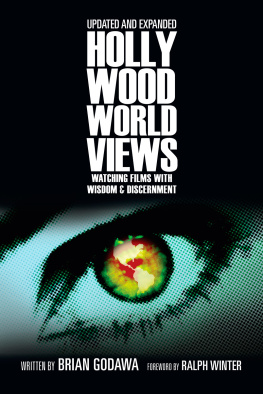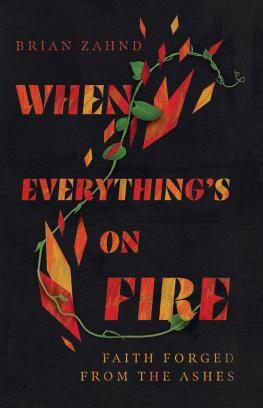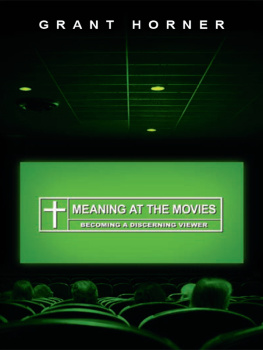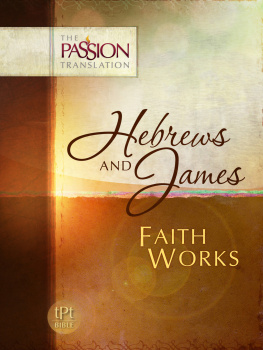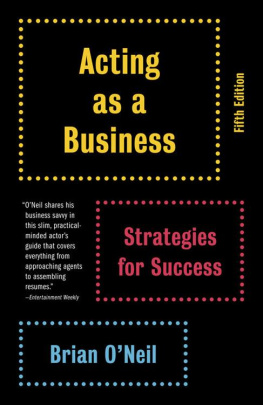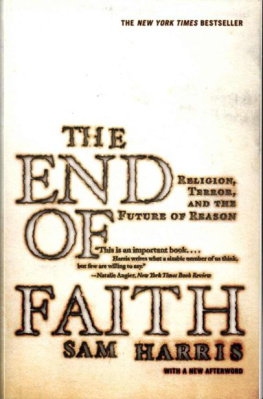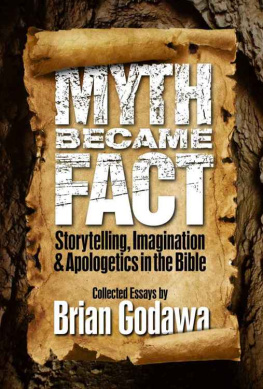UPDATED AND EXPANDED
HOLLY
WOOD
WORLD
VIEWS
WATCHING FILMS WITH
WISDOM & DISCERNMENT
BRIAN GODAWA
FOREWORD BY
RALPH WINTER
InterVarsity Press
P.O. Box 1400, Downers Grove, IL 60515-1426
World Wide Web: www.ivpress.com
E-mail:
Second Edition 2009 by Brian Godawa
FirstEdition 2002 by Brian Godawa
All rights reserved. No part of this book may be reproduced in any form without written permission from InterVarsity Press.
InterVarsity Press is the book-publishing division of InterVarsity Christian Fellowship/USA, a movement of students and faculty active on campus at hundreds of universities, colleges and schools of nursing in the United States of America, and a member movement of the International Fellowship of Evangelical Students. For information about local and regional activities, write Public Relations Dept., InterVarsity Christian Fellowship/USA, 6400 Schroeder Rd., P.O. Box 7895, Madison, WI 53707-7895, or visit the IVCF website at .
All Scripture quotations, unless otherwise indicated, are taken from the New American Standard Bible, copyright 1960, 1962, 1963, 1968, 1971, 1972, 1973, 1975, 1977, 1995 by The Lockman Foundation. Used by permission.
Design: Cindy Kiple
Images: Stockbyte/Punchstock
ISBN 978-0-8308-6953-4 (digital)
ISBN 978-0-8308-3713-7 (print)
This digital document has been produced by Nord Compo.
To the memory of
Francis A. Schaeffer and H. R. Rookmaaker,
who both taught me to see
the worldview behind the art
FOREWORD
Like Brian Godawa, I too love movies. I love the emotional journey that movies take me on. So different from books or music or theatre or art, all of which bring me joy or sadness or excitement, movies involve my senses and my thinking in a way that allows me to escape or go deeper into a place than I ever thought possible.
As a producer and lover of movies for many years now, and as a follower of Christ, I have not found many places where both of these loves can intersect (or collide sometimes). And not many places where deep dialogue can happen on postmodernism and Indiana Jones. Maybe that is why Brian and I became fast friends and why I like this book so much.
Hollywood and the study of the entertainment business, and its impact on our culture, has no lack of commentators. Brian makes his case for understanding the world of movies in a clear and easy way, and he has detailed his argument with many examples from movies. The wealth of examples not only enriches the reading but makes me realize that we have an embarrassment of rich movies and journeys to enjoy.
Reading this book is actually somewhat frustrating since I keep wanting to stop and rewatch the movies he references. Thats because, whether or not I agree with his interpretation of any particular movie, he challenges me to go deeperwhich only makes me love movies even more.
As an accomplished screenwriter, Brian gives a unique commentary to this subject. He knows how to tell a story and how to create a structure and flow to the writing. I find this book to be scholarlyit is well researched and documented like a textbook, but also approachable and readable. I just like to keep Wikipedia handy on those philosophy chapters. And for full disclosure, Brian has worked for me as a screenwriter. I love not only his skills as a writer but also his skill as a working reporter on what we filmmakers do and what it means. We continue to kick around ideas for future movies together.
It is interesting to make movies and then hear others talk about what the movie is about. As filmmakers, it is sometimes shocking and sometimes laughable to hear what reviewers saytoo much analysis or misguided agendas or just over thinking can produce movie reviews that are way off. But sometimes a reviewers comments can be startlingly insightful. That is what I find in reading this bookBrians insights on how to see various movies keep me wanting more, tracking down more, watching more, enjoying more films.
Brian suggests that a good sermon is like a good movie. And for me, both must have three things: great content, flawless structure and some kind of engaging style.
I get asked two questions as a movie producer. First, what is a producer? (There are many books on this, and theres too much to say here.) And second, usually while working on a movie, I get asked, what is the movie about? Content is important to an audiencenot that they want to hear a lesson or a sermon, but they want to know the narrative, what is the story? Is it worth my time? Will I enjoy it?
Developing movies at the studio is usually a process about the structure and the style, not about the content. The writer thinks deeply about this (usually) and so do the principal players (actors, director, producer) since that is how you are going to transmit the story.
But very few reflect about their own worldview or the roots of why this story is going to be told in this way. It just comes out in their art. Brians skill is helping us to view those underpinnings, to see how the story is built and how it impacts our larger cultural thinking. It is a fascinating processwhat comes out of our movies that we cant control but describes who we are inside.
I hope that Brian updates this book every several years, or that we can talk him into a website or blog that applies this kind of thinking to the current crop of summer movies or Academy nominees. I taught a Sunday school class where we examined the Best Picture nominees against some of these same principles. It was the best attended class at the churchwho doesnt want a homework assignment of watching some movies and then coming to class with the Bible to see if we can figure out what it all means. Well now you have no excuseBrian provides the questions and topics at the end of each chapter.
I hope you enjoy the book as much as I do.
Ralph Winter
Producer (X-Men, Fantastic Four, Wolverine)
PREFACE
GOD LOVES MOVIES
God loves movies. Movies are visually dramatic stories, and in the Bible the dominant means through which God communicates his truth is visually dramatic storiesnot systematic theology, or doctrinal catechism or rational argument. A survey of the Scriptures reveals that roughly 30 percent of the Bible is expressed through rational propositional truth and laws. While 70 percent of the Bible is story, vision, symbol and narrative. Sure, God uses words, rationality and propositions to communicate his message. But modern evangelicalism has not always recognized how important visual imagery, drama and storytelling are to God.
VISUALLY
Movies are a visual medium. Cinematic composition, color, light and movement confer emotional states and embody symbolic meanings and ideas with deep effect. Consider the sense of awe at the majestic panoramic depiction of good battling evil in The Lord of the Rings. Remember the visual punch in the spiritual gut experienced through The Passion of the Christ as it incarnated the atonement imagery of Isaiah and the Gospels.
The thousands of miracles that God performed for his people in the Bible were not mere abstract propositions, but signs and wonders, sensate visual displays of Gods glory. Gods own temple was designed by him to be a visually rich engagement of the senses as his people worshipped him, surrounded by colors, images, pictures and statues of visual beauty (Ex 25; 28; 1 Kings 6; 2 Chron 3; 4) New covenant sacraments are visual experiential pictures of grace that are not reducible to abstract propositions.

